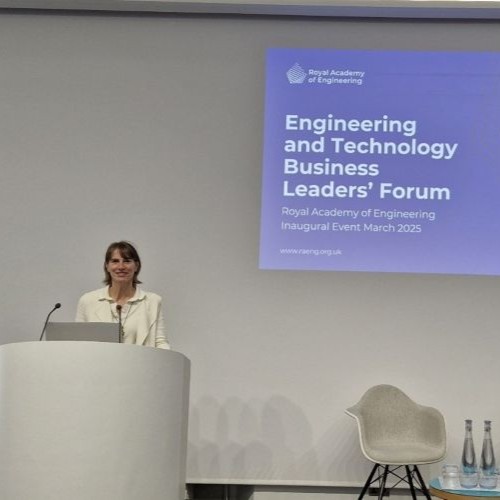What if you could access the collective brainpower of UK industry's most influential engineers and technologists? The Academy’s brand-new Engineering and Technology Business Leaders’ (ETBL) Forum brings together experts and visionaries in CTO, Chief Engineer, and technical leadership roles from its Fellowship, Enterprise Hub and wider network. The Forum connects this group of experienced business leaders to spark collaboration, drive innovation, and platform ideas for future innovation and industrial policy. We held our first forum recently on the theme of industry priorities for the new Industrial Strategy.
The Inaugural Event
The ETBL Forum was launched on 7 March 2025 with an inaugural event focused on understanding industry’s views and priorities for the government’s forthcoming Industrial Strategy, Invest 2035. The event represented an opportune moment to understand what UK engineering and technology business leaders consider to be the most important areas of focus for the Industrial Strategy with respect to both its design and future implementation.
The day’s proceedings were chaired by Dr Caroline Hargrove CBE FREng, CTO of Ceres Power and included guest speakers Sam Lister, Director General for Industrial Strategy and Dr Jo Bray OBE, Director for Advanced Manufacturing at the Department for Business and Trade.
The event’s attendees included leaders from a broad cross-sectoral spectrum of businesses, from start-ups and scale-ups to large enterprises and multi-national corporations. Several of the eight growth-driving sectors targeted in the government’s Industrial Strategy green paper were represented including Advanced Manufacturing, Clean Energy Industries, Defence, Digital and Technologies and the Life Sciences.

The inaugural event was chaired by Dr Caroline Hargrove CBE FREng, CTO of Ceres Power.
After a morning networking session, Sam Lister provided an energising opening talk on the Industrial Strategy. He introduced this as the main driving force for the government’s growth mission and described the need to increase business investment as paramount for this growth. Sam then went on to highlight other key areas from the Industrial Strategy consultation response including visas, skills, business-government engagement and electricity pricing. Sam and Caroline opened the floor for a brief Q&A session which covered a wide range of topics from the implications of political changes in the United States, to the need for a joined-up approach within government, and the UK’s appetite for risk. The session provided context for the day’s proceedings, eliciting an enthusiastic buzz in the room and catalysing participant’s contributions in the following roundtable discussions.
The discussion sessions centred on several key areas of challenge and opportunity inherent to the design and implementation of a successful Industrial Strategy, and the support for growth-driving sectors. This included discussions on innovation, commercialisation, government-business engagement, long-term strategic vision, workforce and skills, and international partnerships. Each topic sparked debate among participants who shared a variety of insights highlighting the staggering role that engineering and technology sectors already play in the UK economy, and emphasising the great successes the country has in its world-leading research and early-stage innovation base. However, a clear sentiment around the room was that there remains an immense opportunity to build on this platform. There is great potential for the Industrial Strategy to address several challenges in broad foundational/infrastructural areas of the economy, late-stage innovation and the support of scale-ups and SMEs.

Networking session taking place at the inaugural event.
Insights from the event
The following highlights summarise the most frequently voiced concerns across the discussion sessions as well as some of the more prescient insights detailed by attendees:
1. Getting the foundations right
The success of the Industrial Strategy and the growth mission relies first and foremost on setting the economy up for success with solid foundational infrastructure improvements in areas of transport, housing, digitalisation and energy. Increased costs and overheads are having a negative impact on early-stage engineering and technology innovation, with ‘garage entrepreneurs’ starting businesses most affected. The need for a longer-term strategic plan for infrastructure development in the UK was remarked upon frequently. For example, the need for improvements in physical and digital connectivity across the UK was highlighted as a way to enable the development of lasting industrial and innovation ecosystems that support future businesses.
We need strong ecosystems that integrate both knowledge and infrastructure. This creates the right foundations for growth.
2. Innovation support beyond technology readiness level 3 (TRL-3)
There is a need for more public funding mechanisms and business incentives for companies scaling technologies beyond technology readiness level 3 (TRL-3). While Innovate UK grants provide an excellent resource for companies, multiple views were expressed that success rates had decreased in recent years, providing less certainty for SME’s innovation budgets. Venture capital (VC) funding is often unable to bridge this gap for riskier investment. Government procurement as an alternative to funding was remarked upon regularly, with sectors such as health, clean tech and defence being cited as areas of opportunity to replace grants with contracts. It was reiterated that infrastructure for engineering and technology scale-ups require additional support with funding beyond initial capital investment into stages of maintenance and operation – so taking the ‘batteries included approach’.
A critical time for companies needing more support is at the pre-commercialisation, post-TRL-3 proof of concept and piloting stage. More capital is needed at this point, but it can be hard to sell something you haven’t built yet.
3. Fixing the skills gap
There is an increasing skills gap in traditional engineering disciplines, such as mechanical engineering. Contributing to this gap is an aging workforce and a competitive recruitment environment. Not only are some engineering disciplines competing for the same talent, but the attractiveness of other more lucrative career alternatives in areas such as finance is also having an impact. Business leaders also expressed the desire that they would like to see more engineering graduates arriving at their companies already with hands-on experience, including in emerging technologies.
It’s getting harder for us to attract top talent in traditional disciplines like mechanical engineering. Especially when we’re now competing with higher paying sectors like Fintech.
4. The government-industry-academia engagement trifecta
The effectiveness of engagement between government and businesses varies dramatically between company size and sector. A key barrier highlighted by SMEs is the often time-consuming and costly process involved in making their voices heard when engaging with government. More broadly across company sizes the routes to engagement with government require simplification, with a need for a more joined-up approach between government departments. Another important point raised was the need for universities to be included in the engagement equation, with academia’s role in innovation and growth being largely left out of the green paper.
We spend a lot of time and resource engaging with the government via a professional agency. Without it we would struggle to maintain that relationship. In all likelihood this isn’t an option for some SMEs
5. International trade regulatory complexity
Companies operating in global markets and contributing to global supply chains experience great difficulty in navigating the complex and divergent regulatory frameworks across multiple international markets. These companies would benefit from more tailored support and better feedback mechanisms from government, with experienced and well-trained regulatory expertise needed to help navigate these complexities. More specifically with respect to the UK’s own export control processes, it was highlighted that regulations could benefit from streamlining, simplification and improvements in consistency, with a joined-up approach between government departments and regulators being deemed a key component to success in this area.
As a smaller business in the MedTech sector it can be difficult to navigate complex regulatory requirements. We would benefit from more tailored support in this area.
Rounding out the day, Forum members heard reflections on the discussions of the day from Dr Jo Bray OBE. Jo finished by providing a challenge for the engineering community to stay engaged and encouraged its continued involvement with the government in the shaping and implementation of the Industrial Strategy.
Next steps
The enthusiastic response from the Forum members on the day, their active engagement in discussions and the valuable insights gathered have highlighted that the engineering and technology business community are a willing and vital participant in the shaping of innovation related policy. The ETBL Forum provides an excellent opportunity to further develop the engagement both between its members and the Academy at large.
The Academy plans to continue developing the ETBL Forum, widening its reach and expanding its capacity and influence. The Academy is uniquely positioned as the UK’s leading convener of experts from across engineering and technology industry. The Academy’s network of business leaders is continuing to expand with a rapidly growing regional Enterprise Hub network in Northern Ireland, Wales, Scotland and Newcastle. By bringing this network of business leaders together under one roof to discuss the world’s pressing challenges, the ETBL Forum constitutes a novel opportunity for gathering, discussing and communicating important insights to inform the UK’s research and innovation policy.
